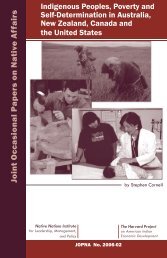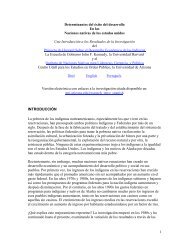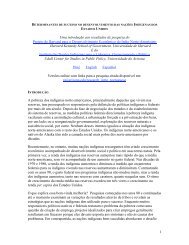American Indian Self-Determination - Native Nations Institute ...
American Indian Self-Determination - Native Nations Institute ...
American Indian Self-Determination - Native Nations Institute ...
- No tags were found...
Create successful ePaper yourself
Turn your PDF publications into a flip-book with our unique Google optimized e-Paper software.
JOPNA Working Papersrights for the <strong>Native</strong> minority. <strong>American</strong> <strong>Indian</strong> tribal sovereignty andthe status of tribes as approximate to that of the fifty states, however,originated in the historic standing of <strong>American</strong> <strong>Indian</strong> tribes as nationsvis-à-vis the policies of Great Britain prior to the founding ofthe United States, and under the treaties of the United States struckwith tribes during the country’s first century. A treaty, at its core, is anagreement or contract between nation states; and the United States andits courts continue to recognize historic treaties with <strong>American</strong> <strong>Indian</strong>nations as such.The contemporary sub-sovereign status of tribes within the U.S. federalsystem is also founded on constitutional principles, as well as considerableCongressional legislation found to be consistent with those principles.Article VIII, Section 8, Clause 3 of the United States Constitutiondecrees that: “The Congress shall have Power to regulate Commercewith foreign <strong>Nations</strong>, and among the several States, and with the <strong>Indian</strong>Tribes.” Indeed, this reservation of powers to the federal governmenthas been key in recent decades in limiting the powers of U.S. statesover tribes and, concomitantly, expanding the sovereign authority oftribes. It was instrumental, for example, in the 1980s in U.S. SupremeCourt rulings holding that, just as one U.S. state could not dictate toa neighboring state whether gambling enterprises would be permitted,so states could not dictate to their tribal neighbors whether gamblingwould be permitted on reservations. This principal – to the effect that,while a tribe may be wholly encompassed within a state, a federallyrecognizedtribe is nevertheless a neighboring jurisdiction (rather thana subservient jurisdiction) – extends well-beyond gambling to suchmatters as environmental protection, natural resource and endangeredspecies management, labor relations, civil and family law, and much ofcriminal law and taxation. 8Tribes now commonly refer to themselves as “nations.” This does notsignify status as nation-states; and tribes lack powers under the U.S.federal system to maintain their own military forces, issue currency,enter into agreements with foreign nation-states, or otherwise exercisepowers superior to the federal government. Paralleling the status of aU.S. state’s citizens, tribal citizens are also voting citizens of the UnitedStates, subject to federal taxes, laws, and regulations. When workingand residing on reservations, tribal citizens are governed by tribal and4







